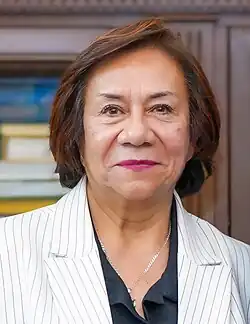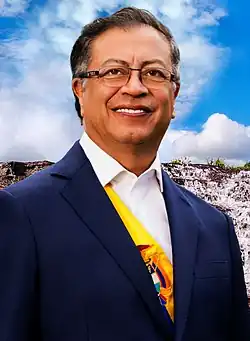Rosa Yolanda Villavicencio
Rosa Yolanda Villavicencio | |
|---|---|
 Villavicencio in July 2025 | |
| Minister of Foreign Affairs | |
| Assumed office 8 July 2025 | |
| President | Gustavo Petro |
| Preceded by | Laura Sarabia |
| Deputy Minister of Foreign Affairs | |
| Assumed office 6 June 2025 | |
| President | Gustavo Petro |
| Preceded by | Daniel Ávila |
| Member of the Assembly of Madrid | |
| In office 11 June 2007 – 7 June 2011 | |
| Parliamentary group | Socialist |
| Personal details | |
| Born | Rosa Yolanda Villavicencio Mapy 13 September 1962 Bogotá, Colombia |
| Citizenship |
|
| Political party |
|
| Other political affiliations |
|
| Children | 1 |
| Alma mater | |
| Profession | Economist |
Rosa Yolanda Villavicencio Mapy (Latin American Spanish: [ˈrosa ʝoˈlanda βiʝaβiˈsensjo ˈmapi]; born 13 September 1962)[2] is a Colombian economist and politician who has served as the acting Minister of Foreign Affairs of Colombia since 8 July 2025, following the resignation of Laura Sarabia. She had served as Deputy Minister since 6 June,[3] after Sarabia had nominated her on 28 May 2025 to replace resigning official Daniel Ávila.[4]
Early life and education
Rosa Yolanda Villavicencio Mapy was born in Bogotá to a Colombian mother of indigenous descent and an Ecuadorian father;[2][5][6][7] her mother had fled political unrest in Tolima in the 1950s.[7] The family, living in difficult economic conditions amid the Colombian conflict, briefly moved to Ecuador between 1968 and 1971; her father spent three years in New York City as an undocumented migrant.[6]
She pursued a bachelor's degree in Economics from the Cooperative University of Colombia in 1984.[3][4][6] In 1987, after being fired because of her activities as a trade unionist and her affiliation with the Workers' Socialist Party, she relocated to the outskirts of Madrid, Spain.[6][7][8] She has held a specialty in International Cooperation for Development from the Complutense University of Madrid, as well as a master's degree in Migration and Intercommunity Relations, since 2023.[3][4][9]
Career
In 1999, Villavicencio joined the Madrilenian wing of the Spanish Socialist Workers' Party (PSOE) and was elected to the Assembly of Madrid for the VIII Legislature (2007–2011), the first non-Spanish woman to hold the position in Madrid[2][3][6] and the second in Spain overall.[7] As a parliamentarian, she was a member of various committees, including Education, Women, and Immigration.[2][3] She has also written op-eds for multiple publications, including El Plural.[2]
Before taking up the office of Deputy Minister, Villavicencio had worked at the District Government Secretariat (2015–2016) and as president (1997–?) and secretary-general (2016–2022) of the Spanish NGO AESCO (America, Spain, Solidarity and Cooperation), which she co-founded; she has been employed at the Ministry of Foreign Affairs since 2022, as, among other things, the coordinator of the working group Colombia nos une ("Colombia Unites Us"), which offers services to Colombians living abroad.[1][3][4][7][5][6]
Controversy
The choice of Villavicencio as Deputy Foreign Minister was met with some criticism for her limited knowledge of foreign languages and for lacking a diplomatic background, in contrast with Daniel Ávila.[10]
In addition, she has been investigated for allegedly providing benefits to AESCO while working at the Ministry, in violation of the norms regulating conflicts of interest, and for purported mismanagement at Colombian consulates in Spain; she was nominated despite pending court decisions.[10][11]
Personal life
Villavicencio lived in Madrid, where she had moved with her husband and daughter (born 1984), for over twenty-five years.[3][6][8] She became a naturalized Spanish citizen in 1994,[8] but renounced her dual citizenship upon assuming the office of Foreign Minister, in accordance with Colombian law.[1]
Books
- Una sudaca en el Parlamento (2011); ISBN 8-4694-7939-3, EAN 9788469479391
- Caracterización de la experiencia migratoria de colombianos en el extranjero (2019, co-author); ASIN B07VKC1NGH
References
- ^ a b c d Gutiérrez, Hanna (10 July 2025). "El alto precio que pagará Yolanda Villavicencio para ser la Canciller de Petro: dejar de ser española". Las2orillas. Retrieved 21 July 2025.
- ^ a b c d e "Yolanda Villavicencio". Colombianas que Cambian el Mundo. 2 March 2011. Retrieved 20 July 2025.
- ^ a b c d e f g "Rosa Yolanda Villavicencio Mapy asumió funciones como canciller encargada". Office of the Casa de Nariño. Presidency of Colombia. 9 July 2025. Retrieved 20 July 2025.
- ^ a b c d "Esta es la nueva vicecanciller de Laura Sarabia tras salida de Daniel Ávila". El Espectador. 29 July 2025. Retrieved 20 July 2025.
- ^ a b "Rosa Yolanda Villavicencio Mapy". Public Servants Directory - Detalle HV. Administrative Department of Public Service. 20 July 2025. Retrieved 20 July 2025.
- ^ a b c d e f g "Yolanda Villavicencio, una emigrante singular". RFI. 25 May 2007. Retrieved 22 July 2025.
- ^ a b c d e Borasteros, Daniel (18 March 2007). "'Antes era todo más fácil'". El País. Retrieved 21 July 2025.
- ^ a b c Borasteros, Daniel (18 March 2007). "'Antes era todo más fácil'". El País. Retrieved 21 July 2025.
- ^ "Hoja de Vida Yolanda Villavicencio" (PDF). Ministry of Foreign Affairs of Colombia. 13 May 2025. Retrieved 20 July 2025.
- ^ a b "Rosa Villavicencio asume como canciller encargada tras salida de Laura Sarabia del Gobierno Petro". El Informador. 8 July 2025. Retrieved 20 July 2025.
- ^ "Cancillería quedó en manos de Rosa Villavicencio pese a cuestionamientos e investigaciones abiertas". IFM Noticias. 8 July 2025. Retrieved 20 July 2025.
